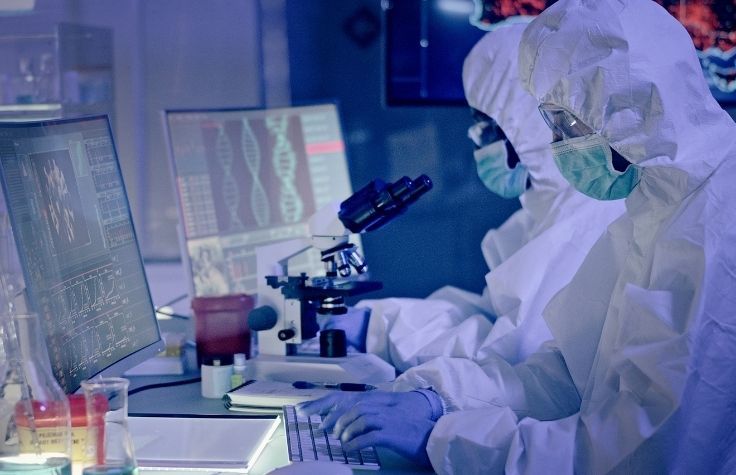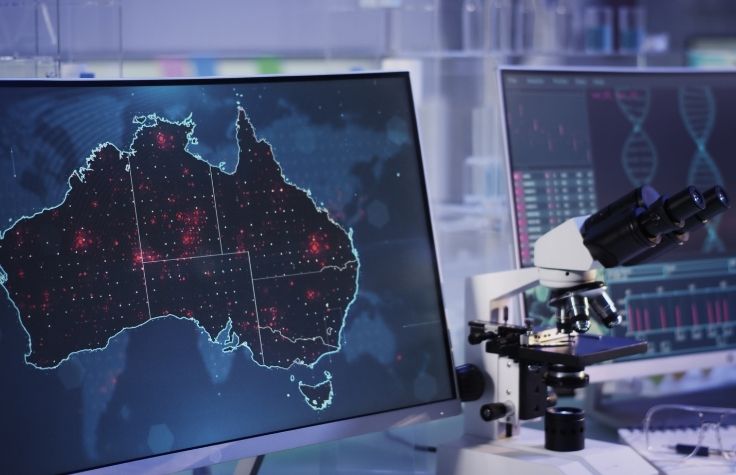
September 14, 2020
Under a groundbreaking initiative, Australian public health laboratories will aim to sequence the virus genomes of all positive COVID-19 tests in Australia and track COVID-19 using genomics across the country, rather than state by state.
Since the beginning of the COVID-19 pandemic, Illumina’s next-generation genomic sequencing technology (NGS) has been leveraged to support research, including therapy and vaccine development, diagnostic, screening and surveillance applications. Now, Illumina is collaborating with the Communicable Disease Genomics Network (CDGN) to track COVID-19 in Australia using NGS, which enables real-time data sharing and integration to better understand the transmission and spread of the virus.
This research will provide us with a better understanding of the behaviour, spread, and evolution of COVID-19, thanks to the precision of next-generation sequencing technology.
UNSW Conjoint Professor Bill Rawlinson, Senior Medical Virologist, said the research project will address the urgent need for national implementation of COVID-19 genomics in Australia.
“This research will provide us with a better understanding of the behaviour, spread and evolution of COVID-19, thanks to the precision of next-generation sequencing technology. The project will enable us to measure the impact of using this technology not only for the COVID-19 pandemic, but also for future responses,” Prof. Rawlinson said.
Along with a AUD $3.3M Medical Research Future Fund (MRFF) grant through The University of New South Wales (UNSW) Sydney, Illumina is contributing more than AUD $2M worth of its genomic sequencing systems and related consumables to the project. These systems are expected to be delivered next week to the Doherty Institute, Westmead Hospital, UNSW at the Prince Of Wales Hospital, and Queensland Health Forensic and Scientific Services, expanding the capacity of the four major public health laboratories in New South Wales, Victoria and Queensland to sequence pathogens, including COVID-19 samples.
“This is a leading global example that will demonstrate the unique value of genomics surveillance in understanding and helping to control the COVID-19 pandemic and Illumina is thrilled to be an instrumental partner of this effort,” Dr Phil Febbo, Illumina’s Chief Medical Officer, said. “The program will allow sharing of vital pathogen data with the use of bioinformatics across states and territories assuring that the sequencing of viral and other pathogens is not limited to this pandemic but will continue to expand in both academic research and the public health systems going forward.”

Other benefits of this project include the ability to identify mutations of COVID-19 in the Australian population to inform the design of treatments and vaccines, and the capacity to precisely identify persistent infection versus reinfection or inactive infection. This holds particular significance to healthcare workers and can help protect the capacity of the frontline workforce and vulnerable patients.
“The CDGN has been working to establish a nationally integrated pathogen genomics initiative that will facilitate the rapid implementation of this project, ensuring national access and consistency in genomics analyses,” said University of Melbourne Professor Ben Howden, Co-chair of the CDGN and Director of the Microbiological Diagnostics Unit Public Health Laboratory at the Doherty Institute. “Information on the national transmission of the virus that causes COVID-19 will be important to informing future public health responses in Australia.”
Across the globe, Illumina NGS technology has been on the frontlines of the pandemic, used for high-volume sequencing that holds the potential to revolutionize public health contact tracing and pandemic control for COVID-19 and future pathogens. Illumina labs in Cambridge, UK are working with Genomics England to sequence the genomes of as many as 35,000 COVID-19 patients, the Institute of Genomics & Integrative Biology in New Delhi has validated Illumina’s COVIDSeq assay and the Shanghai Public Health Clinical Center and Illumina recently opened the SPHCC-Illumina Microorganism Sequencing Research and Application Demonstration Center in Shanghai, China. To help scale testing, Illumina has also recently joined the National Institutes of Health’s Rapid Acceleration of Diagnostics (RADxSM) initiative and will launch its own COVID Testing Service.
“The COVID-19 outbreak is an important reminder that the global community must strengthen national and international programs for early detection and response to future disease outbreaks,” said Dr. Febbo.
Pathogen genomics can reveal information that would otherwise be missed, including rapid insights into the behaviour, spread and evolution of COVID-19. Australia’s national COVID-19 tracking system will have an immediate application in the investigation of outbreaks, including identification of emerging outbreaks and transmission events as part of efforts to reduce community transmission.


